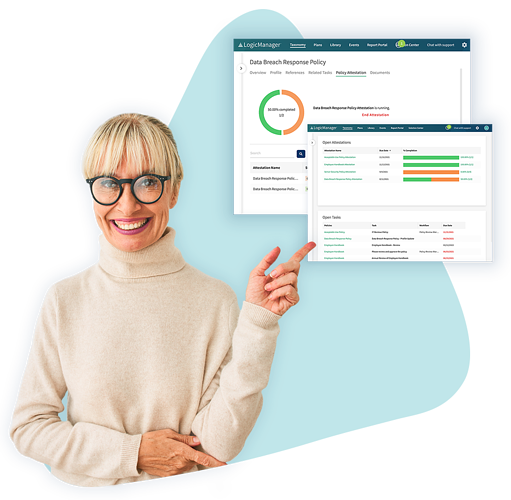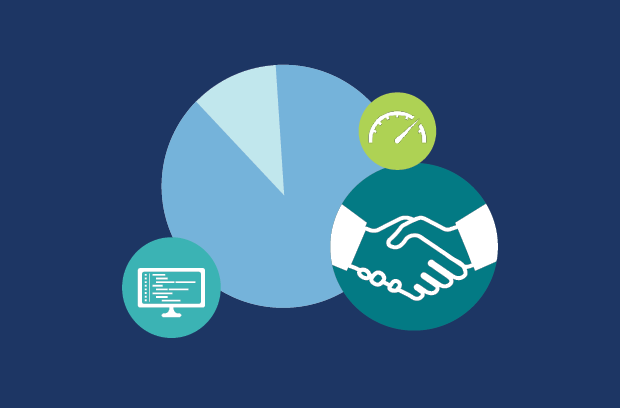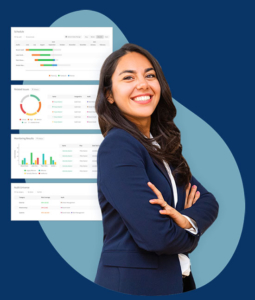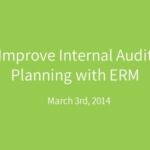Internal Audit Fieldwork
Improve Business Performance with Internal Audit Fieldwork Software
LogicManager’s Internal Audit Fieldwork software empowers organizations to more effectively conduct fieldwork and test control effectiveness, identify issues and findings and track through validation, and easily share in-depth reporting with leadership and relevant stakeholders to discuss the effectiveness of your overall internal audit program. Taking a risk-based approach to your audit fieldwork process allows your organization to prioritize time and resources appropriately, determine functional areas that pose the greatest threats, and identify the most critical controls.
- Customize the LogicManager home screen so that it only displays the most relevant information based on your end users (e.g. their list of controls to review, a testing dashboard, or documentation editing integration points) to keep information centralized and eliminate distractions.
- Built-in Controls & Control Suggestions provide intelligent insights into the controls you already have in place and which ones apply to a given risk across business units, allowing you to reduce the quantity of controls that must be tested and ultimately shrink your compliance burden.
- Automated Assurance connects any failed controls with the risks they’re impacting and instantly updates those risks’ assurance scores, empowering you with the real-time risk awareness needed to proactively improve controls.
- Use our Reporting & Dashboards tools to visually communicate support for your conclusions, control deficiencies, historical results of testing, testing calendars, and more to continually improve your program.
For additional value:
Why Logicmanager? – Users of LogicManager’s Internal Audit software explain how they have benefited from our platform and expert advisory service.
The value-add of LogicManager, to this point for us, has really been the analysts and their help. As much as it would be difficult to build this sort of thing out in a spreadsheet or in SharePoint, it is possible, but that consultancy and the ability to use the analysts to develop these reports and to understand what they’ve seen in different areas has really been the value-add.
The LogicManager DifferenceA Holistic Approach to Internal Audit Fieldwork

Business Decision InsightsFocus on What’s Important
Through our ERM software, we enable our customers to allocate more time to strategic risk management, reducing their involvement in tedious administrative activities like data cleansing and manipulation. Our solution enhances operational efficiency while uncovering the “unknown knowns” that risk managers may overlook, thus ensuring proactive identification and mitigation of risks.
Customer ExperienceStreamline Your Risk Management Program
Unlike other software that requires IT professional customization, our solution allows customers to control engagement through an end-user configuration. This approach enables faster time-to-value and allows organizations to evolve their programs over time, not to mention a quicker return on investment.


Risk-Based ApproachPrepare for Tomorrow’s Surprises Today
A risk-based approach is the key to effective governance, risk, and compliance. By adopting this methodology, organizations can prioritize their efforts across different departments, recognize potential hurdles and crucial interdependencies, and allocate resources appropriately. Embracing a risk-based mindset allows organizations to strategically allocate their resources to areas that hold the most value in terms of privacy protection and compliance.

Complimentary EbookERM Program Audit Guide: Risk Maturity Model
The Audit guide is a valuable resource for your risk and audit teams to work together to make sure you are meeting the obligations of the board. Use the Audit Guide in conjunction with the RMM to confirm your organization’s ERM program is being measured effectively, accurately, and in alignment with the IIA’s standards.
CapabilitiesAn All-In-One Internal Audit Fieldwork Platform
Frequently Asked QuestionsFoundations of Internal Audit Fieldwork
Internal audit fieldwork refers to the phase of the internal audit process where auditors conduct on-site or remote examinations of an organization’s processes, controls, and financial transactions. During this phase, internal auditors gather evidence, test controls, and assess the effectiveness of the organization’s internal controls and risk management practices. The primary objective of fieldwork is to obtain sufficient and relevant information to support audit conclusions and recommendations.
Once the fieldwork is complete, internal auditors move to the next phase of the internal audit process, which involves analyzing the findings, formulating audit conclusions, and preparing the final audit report with recommendations for improvement. Effective and well-executed fieldwork is essential to ensuring the internal audit provides valuable insights to enhance an organization’s risk management, governance, and control processes.
The frequency of audit fieldwork conducted by organizations can vary based on several factors, including the organization’s size, industry, risk profile, regulatory requirements, and internal policies. Generally, organizations perform audit fieldwork on a regular basis as part of their internal audit plan and risk management practices.
Common frequencies for conducting audit fieldwork include:
- Annual Audits: Many organizations conduct comprehensive audits on an annual basis. These audits cover various areas of the organization’s operations, financial processes, compliance, and risk management.
- Quarterly Audits: Some organizations opt for more frequent audits, with quarterly assessments of specific high-risk areas or critical processes. These quarterly audits provide a more regular review of key risk areas.
- Ad-hoc Audits: In addition to scheduled audits, organizations may conduct ad-hoc audits in response to specific events, emerging risks, or management requests. Ad-hoc audits can be conducted at any time when an urgent assessment is required.
- Continuous Monitoring and Auditing: Some organizations employ continuous monitoring and auditing techniques using technology and data analytics to track and assess key risk indicators in real time.
- Special Audits: Special audits may be conducted when significant changes occur within the organization, such as mergers, acquisitions, or major system implementations.
The frequency of audit fieldwork is often determined by the organization’s risk assessment process, internal audit planning, and the need to provide assurance on critical areas of the business. It is essential for organizations to strike a balance between conducting audits frequently enough to manage risks effectively while ensuring that resources are used efficiently and that the audit process does not unduly disrupt day-to-day operations.
Key components of internal audit fieldwork typically include:
- Planning and Scoping: Before starting the fieldwork, auditors conduct a thorough planning phase to define the scope of the audit, identify key risks, and establish the objectives and criteria for the assessment.
- Data Collection and Review: Auditors collect relevant documents, data, and information related to the audited area. They review policies, procedures, financial records, and other supporting documentation.
- Testing and Sampling: Auditors perform testing of controls and transactions to assess their compliance with policies and effectiveness. They may use sampling techniques to examine a representative portion of data when the population is extensive.
- Interviews and Discussions: Auditors interview personnel, including management and staff, to gain a deeper understanding of processes, controls, and potential risk areas.
- Documenting Findings: Throughout the fieldwork, auditors document their observations, findings, and conclusions. Proper documentation is essential for transparency, accountability, and supporting the final audit report.
- Risk Assessment: During fieldwork, auditors assess the risk exposures identified and evaluate the adequacy of existing controls to mitigate those risks.
- Validation of Evidence: Auditors verify the accuracy and reliability of the evidence collected during the fieldwork to ensure its appropriateness for forming audit opinions.
- Communication with Management: Throughout the fieldwork, auditors may interact with management to provide preliminary observations or seek clarifications on specific matters.
By leveraging audit software, auditors can improve the efficiency, accuracy, and effectiveness of their fieldwork. It enables auditors to focus more on value-added tasks, such as analysis and strategic recommendations, rather than spending significant time on manual tasks and administrative work. Ultimately, using software enhances the audit process and contributes to a more robust and valuable internal audit function within organizations.
Additional Resources
Request a DemoLearn How LogicManager’s Internal Audit Fieldwork Can Transform Your Audit Management Program
Speak with one of our risk specialists today and discover how you can empower your organization to uphold their reputation, anticipate what’s ahead, and improve business performance through strong governance.



